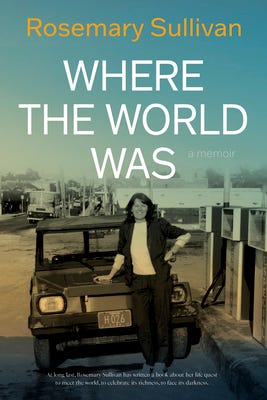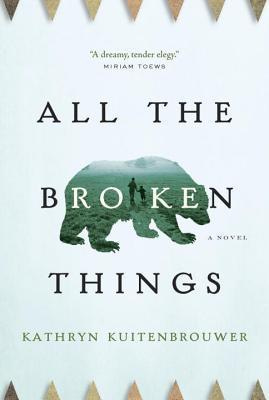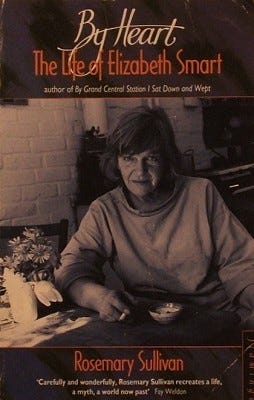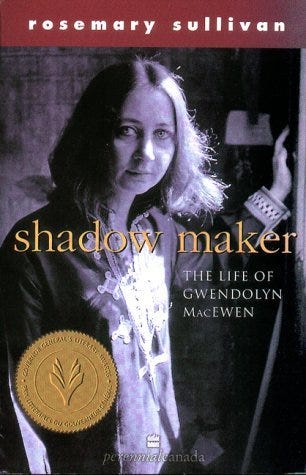Book reviews
New and old reviews of books by Kathryn Kuitenbrouwer and Rosemary Sullivan (and peaks at Elizabeth Smart and Gwendolyn MacEwan)
Two new reviews on the Miramichi Reader site:
Wait Softly Brother by Kathryn Kuitenbrouwer (2023)
Where the World Was by Rosemary Sullivan (2023)
Below older reviews by these two authors, plus an article/interview with Sullivan.
It’s interesting what we remember and what is actual fact, right? I was sure I’d written a review of KK’s 2014 novel All the Broken Things. I was going to post it here. I looked in all the usual places, but I couldn’t find it. Then I realized I’d written something on Goodreads:
Despite being locked into a specific place (Toronto) and time (early 1980s) and linked to historical events and things (Vietnam War, Agent Orange, Elmira chemical plant), the action unfolds in a dream-like manner. Vietnamese refugee family in Canada becomes linked to bear wrestling carnies. It's delightful, sobering, exciting, frightening, and highly readable. Yum.
Not much of a review is it, really? Yet, I have vivid images of the bear from this book and strong warm feelings about the novel overall. It’s a magical read, and I really liked it. I gave it four stars. How cheap! I’ve now upgraded it. Five stars!
Yum.
By Heart: Elizabeth Smart, A Life
by Rosemary Sullivan
Penguin, 1992
[This review first appeared in Imprint, University of Waterloo, May 29, 1992]
Once upon a time there was a woman who was just like all women. And she married a man who was just like all men. And they had some children who were just like all children. And it rained all day. ... In the end the died. Do you insist on vulgar details? Mere gossip? Loathsome gluttony? Chapter one: they were born. Chapter two: they were bewildered. Chapter three: they loved. Chapter four: they suffered. Chapter five: they were pacified. Chapter six: they died.
Elizabeth Smart
Elizabeth Smart wrote the poetic-prose masterpiece, By Grand Central Station I Sat Down and Wept, and may just be Canada's greatest and most misunderstood writer. I mean, The Globe's Jay Scott somehow found it fit to describe her in last March's Chatelaine magazine as "the bisexual bohemian product of a wealthy Ottawa family against whom she rebelled."
Smart, says Scott, "carried on a passionately masochistic relationship with married poet George Barker for 19 years; she even bore him four children." Even, says Scott. It makes you wonder if he even bothered to read By Heart, "the awkwardly written but superbly researched biography" he was supposedly reviewing. What an idiot. What a country.
Elizabeth Smart once described Canada as a majestic country without any people in it, by which she meant there weren't any decent Canadian poets. For Smart, there weren't any people but poets, which was why she had four kids by T.S. Eliot's protégé, George Barker, though they hardly ever lived together and her four children were only four of his fifteen.
Smart wrote By Grand Central Station about the initial stages of her relationship with Barker, when he was drifting between Smart and his wife, manipulating them both and putting down his carelessness to the cause of Art. First published during World War II, the book was well received but quickly vanished. Its powerful poetry only resurfaced to prominence later with the rise of interest in women writers and a democratic reshuffling of the literary canon. Smart's work now stands as one of the pinnacles of poetic-prose of the 20th century.
In her own way, Smart, then, is a transitional figure. Hugely passionate and yet fiercely independent, she embodies both the traditional female mother-archetype and the contemporary feminist-ideal. She had four children because she wanted children. She was obsessed with them all her life. When she read George Barker's poetry in a book store one day, she decided he would be the father of her children — damn the powers that be — and he was. In that way, she was what her generation of told her a woman should be.
But she was also a New Woman, a female writer, a romantic, who wanted to live a life like Byron's. She wanted to live her life with kinetic energy, fight against the forces that would try to hold her back, struggle against the suffering, and win. Of James Bond she once wrote that he could have his mistresses as long as she could have her lovers. Society was hypocritical: it praised adventurous men but damned adventurous women.
...
Reading at Seagram's Museum on May 6 [1992], Sullivan expounded on her thesis that Smart had two primary themes in her writing, love and silence. Smart first pursued George Barker with an obsessiveness that was total and blinding, believing as she did that heroic love would save her from her bland, bourgeois, Canadian up-bringing.
But finding her vision far less than realistic, Smart then turned later in life, like many creative women of her generation (Sylvia Plath comes easily to mind), to trying to find a voice for all the women who are silenced by a culture that dominates and subjugates them.
Smart came from a wealthy family, but she spent the prime of her life as a single mother struggling to make ends meet, dying all the time only to write. She knew only too well what she came to call "woman's lot." Smart's second book, The Assumptions of Rogues and Rascals, illuminates her second theme. She "rebelled" (said Scott)? Good God, I hope so.
At one point in By Heart, Sullivan poses the rhetorical question, How then do you survive life's script? "By a rage of will," she says and quotes Smart:
Like this: pray; bang your head; be beautiful; wait; love; rage; rail; look, and possibly, if lucky, see; love again; try to stop loving; go on loving; bustle about; rush to and fro. Whatever you say will be far less than the truth.
"Refuse dismay and battle on regardless," says Sullivan, "which is what Elizabeth did. Indeed, Elizabeth believed the only response to life was 'ecstatic surrender' since life has a will stronger than yours. 'It is not for you to know.' She would always ask herself, 'Can't I possibly be a little braver?'"
Elizabeth Smart, says Sullivan, "lived on a vertical plane, where ecstasy or pain could deliver themselves like shafts shattering the moment." And — oh! — she is so sad! Her language has such strength and yet she was so subsumed by her need to love and be loved. She couldn't believe she was a good writer until a man told her she was. But not just any man, a poet. Barker, thankfully, gave her that praise, and Smart gave us her prose.
So full of contradictions, it is difficult to know what to make of Smart's life in our contemporary context. Her absolute devotion to her children might be seen as an attack on women's progress in the workplace, and yet Smart broke through many — if not all — of the social taboos of her day (and these days, too). That she is a great writer is gospel. Her life will only grow in significance. Rosemary Sullivan has done her well.
This article first appeared in The Varsity (Sept. 1995).
Rosemary Sullivan, an English professor at the University of Toronto's Erindale campus, says Canadians are caught in a kind of cultural amnesia. That's one of the reasons she wrote the recently released Shadow Maker: The Life of Gwendolyn MacEwen (Harper Collins, 1995).
"Canadian culture doesn't have as many literary biographies as one would expect at this point in its history," says Sullivan. "And we need to recover those cultural moments and figures."
Canadian literature has reached a point in the 1990s where it can begin to look back critically and with nostalgia on the 1960s, when it made its first major cultural impact.
"In the 1960s a national project was acting as a catalyst to push the writing," says Sullivan.
Social events like Expo '67, which celebrated Canada's 100th birthday, and the introduction of the Canadian flag in 1965 help spur a growing nationalism. Canadian literature as we have come to know it was born in this period. And MacEwen, who published more than 20 books before her often troubled life ended in 1987, was a significant part of that birthing process.
An intensely talented writer with an original, if somewhat odd, personality, MacEwen serves as a emblem of the writers that laid the foundation of the Canadian imagination.
"It's valuable to write about her to show how textured and rich that period of the 1960s was," says Sullivan. "MacEwen had an originality and range as a writer. And she lived in a time when Canadian culture was just beginning to define itself."
Born in Toronto's west end in 1941, MacEwen grew up in the Keele and Bloor district. After she dropped out of high school two months before graduation, she saw her first novel, Julian the Magician, published in New York City when she was only 19-years-old. That novel has since been called one of the great works of the modern period.
Her later books included 11 collections of poetry, two short story collections, a second novel and three children's books. She also followed up her consuming interest in mythology by teaching herself Hebrew, Arabic and classical and modern Greek. Looking back on her life, it is difficult to come to a simple understanding of such a complex person.
Sullivan sums up MacEwen's life this way: "It's the narrative of a young woman inventing herself out of almost impossible odds with fierce intellectual training, turning herself into a remarkable writer at a moment in time that was very interesting."
Simple enough, perhaps. But is it enough to know that MacEwen's mother was in and out of mental institutions her whole life? Can the poetry be explained by the knowledge that MacEwen's father wasted his talent for photography and ended up an alcoholic on skid row, passing on his artistic ambitions to his youngest daughter? Sullivan thinks not.
"MacEwen's life had a tragic cast," she says, though she's quick to point out that no one should feel sorry for her.
"Pity implies a type of condescension," she says, "and there's too much intellectual and imaginative energy there [in MacEwen's life] for one not to feel amazing admiration."
Sullivan says she was anxious to make it clear how exciting the writer's life can be, although illustrating that life is difficult because so much of it is lived in the mind. MacEwen's early life had much pain, she says, but it also demonstrated a remarkable courage and prepared her to be the sort of writer that she would become.
"As her family was falling apart, MacEwen was writing magical books about magicians," she says. "She was always seeking some way of turning pain into affirmation."
MacEwen's only criticism of modern poetry was that it often seemed to be a reflection on pain. And she, who was so aware of the dark side of the psyche, wanted to celebrate life.
A writer with a Romantic temperament, MacEwen took the elements that life had given her and consolidated them in her art. One of her lovers told Sullivan that MacEwen was not an allegorical poet.
"What she was writing was her real life," she said.
"It was as if she lacked a kind of protective covering," says Sullivan. "The world seemed so immediate [to her] and constantly present that it seemed too much of an assault."
It was this assault that Sullivan postulates dragged MacEwen down into the dark regions of her psyche and pushed her towards the binge drinking that eventually ended her life.
The biography reads like a detective story. Sullivan uses the first-person voice to insert herself into the narrative, pointing to the architecture of the narrative. It's a way of demonstrating that writing a biography is a balancing act between the objective and the subjective.
"As soon as you turn a life into a narrative, you're selecting out what you think is relevant," she says. "Someone else would write the life differently, emphasizing different points."
She says MacEwen divided her life into separate compartments. There were many friends of hers who were unaware of other friends, which made writing the biography that much more difficult. There was often only one version of events and no corroborating evidence. But, Sullivan adds, there is always a place for doubt.
"To suggest that one can locate a truth about a life is presumptuous," she says. "An arrogant assurance that 'this is what's going on' is dangerous."
Shadow Maker is Sullivan's second literary recovery project. Her first, a biography of prose poet Elizabeth Smart, was nominated for the Governor General's award for non-fiction.








